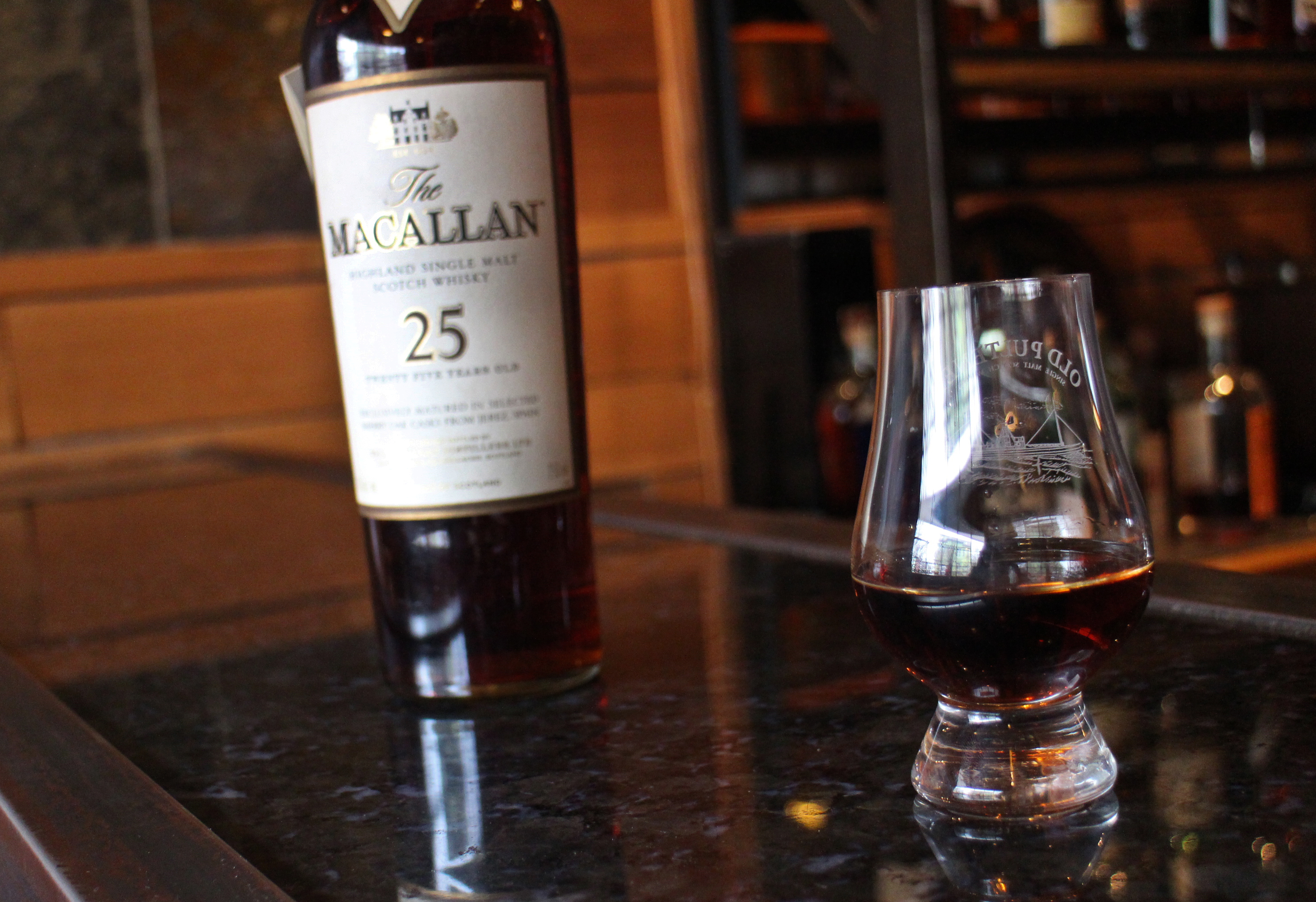
High-end liquor like Macallan Scotch Whiskey is the sort of spirit the bill has in mind. (BizSense file)
The state Senate has passed legislation that could ease a regulation that’s long been a point of contention for many Virginia bars and restaurants.
Senate Bill 168 would lower the 45 percent food-to-liquor annual sales ratio currently required of businesses that hold mixed beverage restaurant, caterer’s or limited caterer’s ABC licenses.
The ratio, a sore spot for establishments that sell liquor, requires those businesses to have at least 45 percent of their gross receipts come from food sales, leaving 55 percent of annual sales available to be filled out by liquor sales.
For years many booze purveyors have argued that the ratio is too difficult to meet and that it has driven some out of business.
If the bill becomes law, holders of such ABC licenses with monthly food sales of at least $4,000 but less than $10,000 would have to meet or exceed a new 35 percent food sales ratio requirement. Licensees with higher monthly food sales, those that make $10,000 or more, wouldn’t be bound to a sales ratio under the legislation.
The patron of the bill, Sen. Bryce Reeves, R-Spotsylvania, said the intended effect of lowering the ratio is to make it easier for businesses to offer “high-end” spirits, which come with a price tag that makes them trickier to sell within the bounds of current sales ratio requirements.
“Several years ago we had some of these high-end restaurants and bars that wanted to sell high-end spirits,” Reeves said in an interview before the Senate vote. “To hit the ratio (with spirits), you priced yourself out of the food part. You can only sell so many steaks.”
The Senate unanimously approved the bill Wednesday and the legislation now heads to the House of Delegates. Should it pass the House, it will then go to the desk of Gov. Glenn Youngkin, who would consider whether to sign the bill into law.
Unlike liquor, beer and wine aren’t subject to food-to-beverage sales ratio requirements in Virginia.
According to the bill’s language, mixed beverage restaurant licensees would calculate their food-to-beverage ratio by dividing their gross receipts from food and nonalcoholic drink sales by the gross receipts of those sales combined with liquor sales served on premises.
As for mixed beverage caterer’s and limited caterer’s licenses, the ratio would be determined by dividing gross receipts from food and nonalcoholic drinks served at an event by the gross receipts of spirits, food and nonalcoholic drink sales at the event.
While the bill would lower the 45 percent ratio required by existing law, it would also allow the ABC board to set food-to-beverage ratios for those three license types, a move that Reeves said would give the regulatory board more autonomy to set policy.
Reeves has unsuccessfully introduced similar legislation in previous sessions. This time around, he said he likes the bill’s chance for approval, thanks to the large amount of legislator turnover the General Assembly has seen amid redistricting and the wave of retirements that followed.
“A lot of the old guard is gone,” he said. “I thought this year would be a good year to bring it back.”

High-end liquor like Macallan Scotch Whiskey is the sort of spirit the bill has in mind. (BizSense file)
The state Senate has passed legislation that could ease a regulation that’s long been a point of contention for many Virginia bars and restaurants.
Senate Bill 168 would lower the 45 percent food-to-liquor annual sales ratio currently required of businesses that hold mixed beverage restaurant, caterer’s or limited caterer’s ABC licenses.
The ratio, a sore spot for establishments that sell liquor, requires those businesses to have at least 45 percent of their gross receipts come from food sales, leaving 55 percent of annual sales available to be filled out by liquor sales.
For years many booze purveyors have argued that the ratio is too difficult to meet and that it has driven some out of business.
If the bill becomes law, holders of such ABC licenses with monthly food sales of at least $4,000 but less than $10,000 would have to meet or exceed a new 35 percent food sales ratio requirement. Licensees with higher monthly food sales, those that make $10,000 or more, wouldn’t be bound to a sales ratio under the legislation.
The patron of the bill, Sen. Bryce Reeves, R-Spotsylvania, said the intended effect of lowering the ratio is to make it easier for businesses to offer “high-end” spirits, which come with a price tag that makes them trickier to sell within the bounds of current sales ratio requirements.
“Several years ago we had some of these high-end restaurants and bars that wanted to sell high-end spirits,” Reeves said in an interview before the Senate vote. “To hit the ratio (with spirits), you priced yourself out of the food part. You can only sell so many steaks.”
The Senate unanimously approved the bill Wednesday and the legislation now heads to the House of Delegates. Should it pass the House, it will then go to the desk of Gov. Glenn Youngkin, who would consider whether to sign the bill into law.
Unlike liquor, beer and wine aren’t subject to food-to-beverage sales ratio requirements in Virginia.
According to the bill’s language, mixed beverage restaurant licensees would calculate their food-to-beverage ratio by dividing their gross receipts from food and nonalcoholic drink sales by the gross receipts of those sales combined with liquor sales served on premises.
As for mixed beverage caterer’s and limited caterer’s licenses, the ratio would be determined by dividing gross receipts from food and nonalcoholic drinks served at an event by the gross receipts of spirits, food and nonalcoholic drink sales at the event.
While the bill would lower the 45 percent ratio required by existing law, it would also allow the ABC board to set food-to-beverage ratios for those three license types, a move that Reeves said would give the regulatory board more autonomy to set policy.
Reeves has unsuccessfully introduced similar legislation in previous sessions. This time around, he said he likes the bill’s chance for approval, thanks to the large amount of legislator turnover the General Assembly has seen amid redistricting and the wave of retirements that followed.
“A lot of the old guard is gone,” he said. “I thought this year would be a good year to bring it back.”




One may still recall the era in which any movement of a beer or cocktail within a restaurant, say from one table to another, had to be done by a restaurant employee. You couldn’t take your drink to another table to join friends. You had to have an employee do it. A friend from Cal Ifornia commented to me in 1978 that the law was ridiculous. I “I can’t walk my beer from table A to table B but every yahoo with a pickup truck is driving around with one in his hand”. ( Fortunarely the law has taken all… Read more »
Comparatively, that “Table A to Table B” rule isn’t really that bad, Bruce. I come from Utah.
Sounds like a law in search of a problem.
Someone let me know if I’m incorrect. However if you sell a lower amount of food you’re bound by the ratio and if you sell a higher amount of food you’re not? Why don’t we just get rid of the ratio all together? Seems like it’s over reach at it’s finest.
This proposed change is long overdue and many area restaurants, especially those that are locally owned, will be glad to have one less hurdle for doing business. I don’t want to have all restaurants turn into watering holes, but I do want businesses to have more freedom to keep operating. The rules we currently have are one reason we’ve never had much of a nightlife scene in Richmond (or anywhere in Virginia really).
I imagine there is some sort of puritanical origin to this law, and it’s designed to discourage excess drinking, or something? If that’s the case, what was the logic behind it? It just seems to penalize the business without at all impacting customers’ consumption. If I want to go take 10 shots at the “restaurant that serves liquor” down the block without taking a bite of food, I can do that. It’s not like I also have to order 5 burgers.
The ratio should be removed altogether.
I’ve run restaurants in Maryland, New York, Washington, D.C., North Carolina, and Virginia. Virginia has some of the most antiquated and ridiculous liquor laws in the country. Laws written both before and after Prohibition remain on the books. There should be “classes” of licenses. One for carry-out and retail. One for restaurants. One for bars and nightclubs. It’s stupid to tie food to it. The guy who ran McCormick’s was right. If he’s selling a $300 shot of bourbon, he has to sell an incredible amount of food to hit his ratio. The guy selling cheap cans of PRB can… Read more »